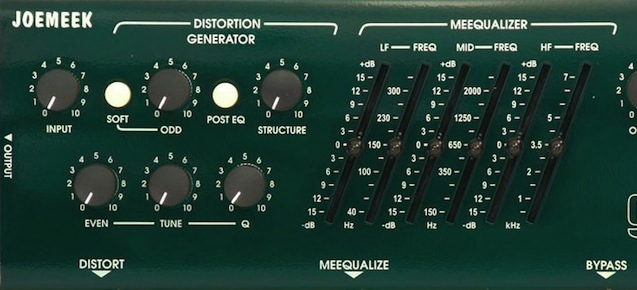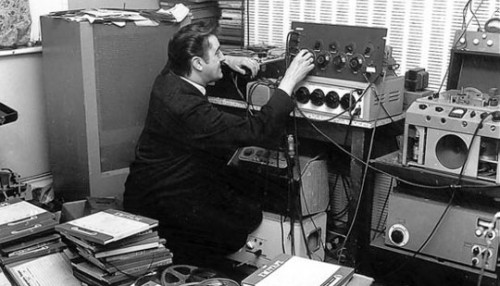
Quite a bit of the current hoopla surrounding legendary 60s British record producer Joe Meek concentrates on his life and persona at the expense of the music itself. That is, the personal facts, which are definitely interesting (extremely interesting, even) have overshadowed the man’s super-normal (and I have no problem saying, supernatural) gift for hearing sound/s. At least, they are subordinated to his seemingly outrageous personality. If interest in Joe’s life has tended to prevent listeners from taking in the dimensions of his music, perhaps this short appreciation might help to shift the balance a little.
One of the most interesting observations about Joe Meek came in a piece in The Guardian almost five years ago:
“He was terminally square,” says Tom Cowan, who prefers to be known as Tomethy Furse and plays bass in goth-garage band the Horrors. “Everything he ever did was an attempt to capture what was currently cool and hip in British music, but unfortunately he was so set in his ways that each one came out completely square and unhip, which is why they sound so unique.”
It’s true. Meek was a true “Square”, and never stopped being a Square; and YET, he heard all these extraordinary sounds, all around him, and within him, which, combined with the Square sentiments of almost all his songs (i.e., hundreds and hundreds of them, you could almost say, without much exaggeration), make his music universal.
Let’s take the song “Let’s Go See Grandma” by Joy & Dave. It is classic Joe Meek, in that the sentiment is completely true to life, “stupid”, quaint, fun, and finally delightful and true to all times and places (oddly but yes); yet, the sound of that electric violin, and the way he gets it in there throughout — this makes it a song that is also interesting, and possibly unforgettable.
Thus the “Square” aspect, which you can find in almost all of Joe’s work, even through The Cryin’ Shames at the very end, and Glenda Collins’s amazing “There’s Something I’ve Got to Tell You”, which was among the last songs he recorded, when coupled with (as it always was coupled with, almost without any exceptions I can find, and I think I may have listened to almost all of it that is currently available) the Heard-from-Above sound ideas, make his songs, loopy as they truly can be, break down the barrier between past and present.
[youtube=http://www.youtube.com/watch?v=lkOPguGwDTQ&w=600]
Let me go even further: Because of the Square (i.e., sentimental, hackneyed, and HEARTfelt — you could say, they excel in the “True Cliche”, or rather the cliche that expresses a common truth of life) aspect, linked to the Revelational (and I mean truly inspired, or “not of this earth” — which I don’t see how anyone who actually listens to what he did can deny) Sound aspect, Meek’s work is a kind of perfect communication: Perfect Communication because it is able to transcend the circumstance of past and present in favor of collapsing past and present into one. I would honestly argue it that far.
Some further possibilities to listen to would be:
 “Twenty Flight Rock” by Heinz
“Twenty Flight Rock” by Heinz- “Walk With Me, My Angel” by Geoff Goddard, sung ideally by Don Charles
- “Telstar” by The Tornadoes. Really a song that will never ever date, never ever, right down to our children’s children.
- “Dumb Head” by The Sharades
- “Just Like Eddie” by Heinz
- “My Friend Bobby” by Pamela Blue (and written, again, by Goddard)
- “Questions I Can’t Answer” by Heinz
- “Colour Slide” by The Honeycombs
- “Have I the Right” by The Honeycombs (which will also never date)
- “Please Stay” by The Cryin’ Shames
- “Singing the Blues” by Jason Eddie & The Centremen. Where did he come up with that frantic guitar sound?!
- “Can’t You Hear the Beating of My Heart?” by Heinz
-
“Sky Men” by Geoff Goddard
-
“It Ain’t Right” by The Saxons. A mediocre performance BUT underneath it Meek has placed a Ritchie Blackmore guitar part that is going so out of control, and finally does go out of control, that the entire little song gets swallowed by a tornado. The record embodies inspiration that is bigger and larger and more (in every sense) pentecostal than anything the artists bring to it. Meek invades something humdrum, and just overwhelms it. It’s therefore not a success, as a whole; but is a most rewarding failure.
-
And, last but not least, Joe’s last single, “It’s Hard to Believe It” as sung by Glenda Collins. Joe’s ideas about moonmen coupled with his sadness at the inhuman state of the world, stated with childlike un-boundaried feeling, make this last a landmark disc in the history of pop music.
[youtube=http://www.youtube.com/watch?v=xbeV0jShbDQ&w=600]
Any playlist of Meek’s work will never be adequate, because there is so much to it. The point on that point would be that, almost any song that Meek produced is interesting simply because he “funneled it through” his head and invariably could not help adding or contracting or enhancing what he heard. Thus a terrible song like “Shirley” by The Strangers, a truly trite song sung awfully (i.e., tritely) and with little or no inspiration, has an intro (not more than eight bars, or less) that is beyond good, and so utterly bewitching that you can’t get it out of your head. So the song and the performers are not good, or at best extremely mediocre. But the point is Joe Meek’s “screen”, through which the sound, even in the case of silly “Shirley”, becomes utterly memorable.
Or take “Big Fat Spider”, by Heinz. It’s dicey as a song, but Meek had the wonderful sense to use Ritchie Blackmore — many, many, many sessions — so the song is really quite unusual, even threatening. At the same time, it’s off the wall. I could offer literally 120 other such examples.
[youtube=http://www.youtube.com/watch?v=HnIa8yNaurA&w=600]
What “Meekophiles” don’t often understand — they are not churchgoers in general — is that several of the Old Testament prophets, including John the Baptist in the New, were considered by many people to be insane. Their very gift of vision was linked with a sort of insane-seeming affect. You see this often in the Bible. Joe Meek’s “insanity” is not worse — except at the very end — than any number of inspired “seers” in the OT.
[youtube=http://www.youtube.com/watch?v=NiZfY48ftcM&w=600]
[youtube=www.youtube.com/watch?v=eaNJDZRn3D8&&w=600]

COMMENTS
8 responses to “Touched by an Angel: The Divinely Square Joe Meek”
Leave a Reply














Being the only Meek fan I know, I thought I knew a thing or two but have been proved an utter dilettante. Great compilation!
I’ve often thought Meek to be a time traveler in a way, bringing a post-modern perspective and technical savvy back to a (largely) uncomprehending populace, but “seer” or “prophet” is a more complete way to think about him. Thanks for this article, hope it gets passed around the Meekophile boards.
I hear a new world. Too bad Joe couldn’t live in it.
I can’t get over the frenetic guitar on that Jason Eddie and The Centremen song!! Also, what’s a centreman?
I think the writer could have amplified Tom Cowan’s point a little.
The fact that Meek was so connected to a sort of “Johnny Angel”/”Teen Angel” world-view,
at least in the music, made sure that he was more or less out of touch with his actual times
most of the time.
Thus his successes in the charts were completely unpredictable, not to mention quite few,
at least in relation to the output.
Yet NOW, for that very reason, for the reason that he was not closely connected to his times,
the music touches some universal chords.
Even the most kitschy of his records have a growing charm,
for example, “Walk With Me My Angel” and “Angela Jones”.
I think this may say that if you’re “out of touch” with your context,
you may be “IN touch” with other contexts.
When the BBC “Arena” documentary on Meek’s life ended with the graffiti,
“Joe Meek Lives!”, I think they were probably saying something that will become
increasingly actual, as time goes by.
Interesting take on Joe’s sound, though, having listened to over 1500 tracks over the course of the past decade or so during the making of our doc, A LIFE IN THE DEATH OF JOE MEEK, is that Joe’s touch was far more diverse and experimental and influential than even his fans give him credit for (for example, just listen to some of the Northern Soul being produced in the UK in the late ’60’s – The Flirtations, for example – the music wants to emulate Stax, but the sound – the intense compression is all Meek). We love the excellent ideas being put forward here both in the article and in the comments. We love to know that Joe’s music still makes people wonder. For those who may be interested, please find us on Facebook and “like” our page. Mid-June we will launch a Kickstarter campaign to raise funds to finish and distribute the documentary which contains interviews and insights with Jimmy Page, Steve Howe, Chas Hodges, Keith Strickland, Edwin Collins, John Leyton, members of The Honeycombs, The Tornados, The Outlaws, Joe’s family, Humphrey Lyttelton, etc. any and all help to spread the word will be infinitely appreciated.
All those interested in learning more about Meek’s recording techniques and gear may wish to check out my book: Joe Meek’s Bold Techniques, now available as an eBook Second Edition via iTunes, Barnes & Noble, Amazon, and other retailers for about $4.99 (including a restored and remastered version of Meek’s 1959 stereo album, I Hear a New World). http://www.barrycleveland.com/meek.htm